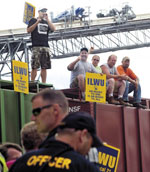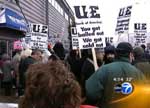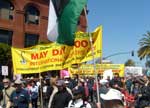
Showdown on West Coast Docks: The Battle of Longview
(November 2011).
click on photo for article

Chicago Plant Occupation Electrifies Labor
(December 2008).
click on photo for article

May Day Strike Against the War Shuts Down
U.S. West Coast Ports
(May 2008)
click on photo for article

June 2020
Fruit Packinghouse Workers Stand Up for Their Rights
Yakima Strikes:
The Battle Has Just Begun

Strikers at Columbia Reach packinghouse in Yakima, Washington, June 3. (Evan Abell / Yakima Herald-Republic)
On May 28, after 22 days on strike, workers at the Allan Bros. packinghouse in Naches, Washington, celebrated an agreement with the company and returned to work on Monday, June 1. As the workers committee returned from negotiations with the company with a signed document, strikers held a prayer meeting, ending with a chant of “¡Sí se pudo!” (yes, we did it). A similar agreement was reached at Monson Fruit in nearby Selah on May 22. On Friday, June 5, Matson Fruit in Selah settled, leaving Columbia Reach in Yakima as the last ongoing strike. But as many strikers commented to The Internationalist, the struggle has only just begun.
Over the course of the strike movement that broke out at Allan Brothers on May 7 and spread to eight area packinghouses, many people commented that nothing like this had been seen in the Yakima Valley for decades. The strikers demanded protective gear and cleaning of the facilities, plus $100/week hazard pay and 40 hours work. Management handed out masks and disinfectant, with some spacing out on the conveyor belt, but only agreed to recognize the workers’ committee and to bargain with it on the demand for higher pay. Yet for the strikers, who started with zero, the fact that their struggle made some gains can be a first step on the road to winning a union.
As the year began, could the arrogant bosses who own the valley have imagined that “their” workers would dare to defy them by walking out – in the middle of a pandemic! – and force them to the negotiating table? Now, instead of keeping employees in line through a hierarchy of managers, they have to formally bargain with workers’ representatives fortified by three weeks on strike. Workers underlined that they secured an agreement, and went back with no reprisals. As Angelina L. commented, “It's been 35 years, nobody has ever done any changes in any company, so for us that is a big win.” Now come the negotiations over wage demands.

Striking workers, mostly women, at Columbia Reach packinghouse in Yakima, Washington, June 3.
(Evan Abell / Yakima Herald-Republic)
The large majority of the workers in the packinghouses are women, as were the strikers who stuck it out in the face of company attempts at intimidation – an unfair labor practices complaint against Allan Bros. was filed with the National Labor Relations Board (NLRB). “I’m very proud of what we achieved” despite “all the humiliation and reprisals,” said Felicitas R. “If we are united, we can do it,” she said, adding: “And even if we are not united, we can stand up for our rights. Never give in.” María Cecilia G. said that the struggle was vital “for all the people who come here, very young, and spend their whole lives in the United States, with all the obstacles.”
Throughout, the bosses have played hardball. At Hansen Fruit, management wore down the strike until only one worker was left standing. Strikers rallied to celebrate at Frosty Packing on May, voting to go back to work, only to discover later that day that there was no deal. Columbia Reach bosses have yet to meet with the workers and have refused the demand for a $1 an hour in hazard pay. But in a movement that swept through the valley, the agreements – or lack of an agreement – are only a preliminary result. The fact that hundreds of combative workers rose up and stood firm through weeks of hard struggle is a huge event – and the bosses know it.
The outcome will not be determined by legal fictions like the “good faith” of the bosses, the “good will” of the governor, or the regulations of various state and local agencies, from the NLRB to Yakima County Health Department, which quickly gave the packinghouses a clean bill of health after workers walked out over unsanitary conditions. Strikes are class struggles. They test the power of the working class against the power of capital. The bosses have the money and the property. They own the fruit that the workers pick and pack. The government and its armed enforcers do their bidding. Anyone who questions that, the sheriff will set them straight.
The workers’ power lies in their organization and consciousness. The workers at the Yakima fruit packers are getting organized. The small farmworkers union from northwest Washington, Familias Unidas por la Justicia, came in at the invitation of the strikers to provide advice and support, and has been on the scene every day. But as we wrote in our May leaflet, “While production at some plants has been slowed, it has not been stopped. Trucks and scabs pass in and out without trouble.” This has remained true throughout, and the consequences weigh heavily on the workers who continued resisting day after day.
Action by the entire labor movement is key to achieving a victory in Yakima. The AFL-CIO representative in the Valley, Dulce Gutierrez, has been on the picket lines, but only after more than three weeks on strike did the Washington AFL-CIO bureaucracy finally bestir itself. On Saturday, May 30, an auto caravan converged on Yakima from Seattle and other points. Some 80 cars of union staffers and some members proceeded over the course of a couple of hours from one quiet weekend plant to the next. They honked their horns, emerged from their cars for a few moments at each site to applaud each other as the word “solidarity” flowed freely from their lips, and at about 1 p.m. the event concluded with catered tacos in a city park.
But the power of the organized working class has not been brought to bear to win the strikes. Supermarket workers organized by the United Food and Commercial Workers Union (UFCW) could refuse to handle fruit from the struck packinghouses. Teamster truckers and UPS drivers could refuse to cross strike lines. The Teamster-organized Del Monte fruit processing plant could go out. There are hundreds of union construction workers fighting for safety at the nearby Hanford nuclear cleanup site. Washington Education Association teachers struck across the state two years ago. To win any lasting gains for Yakima workers, this power must be mobilized.
Already, the packinghouse workers strike has stoked a spirit of rebellion in the Valley. To the annoyance of local rulers, there have been repeated Black Lives Matter demonstrations in the city protesting the racist police murder of George Floyd in Minneapolis. A May 31 protest drew many hundreds of marchers and a long car caravan. The bosses worry that a unionization drive could spread to fruit pickers on the ranchos. The strike could also undercut the reign of terror by Immigration and Customs Enforcement (I.C.E.), whose agents infest the region, while regular deportation flights take off from Yakima airport.
The fruit packers’ strike in Yakima can serve as a beacon to workers in packinghouses across the country – overwhelmingly African American, Latino and immigrant – which have been infested by the coronavirus due to the bosses’ disregard for workers’ health and safety. When the pandemic struck, it was discovered that these workers were essential, even though still treated as disposable and oppressed. Yakima County now has 4,000 confirmed cases of COVID-19, with the highest rate of infection on the West Coast. This week strikers honored David Cruz, a worker at Allan Bros. who participated in the strike until he fell ill and has now died of the virus.

Packinghouse workers demonstrated on June 4 outside state Department of Labor offices (above) and then headed to Yakima Health District honoring David Cruz, a striker who died of coronavirus. Sign says: “How many dead from COVID-19 are necessary?” (Evan Abell / Yakima Herald-Republic)
To stop the ravages of the virus and raise the tens of thousands of minimum-wage workers out of poverty, it is crucial to make use of this moment when their labor is indispensable. The Internationalist Group and Class Struggle Workers – Portland have been present on the strike lines, emphasizing that “unions across the state must mobilize now to build mass picket lines to win the strike, and make Yakima a stronghold of union power” (The Internationalist, 8 May). A successful union-organizing drive extending to the Tri-Cities area to the east will require a leadership that goes beyond narrow “business unionism” to defend all oppressed groups.
As Karl Marx emphasized a century and a half ago, “every class struggle is a political struggle.” For decades, struggles to unionize the workers in the fields have largely failed as they have been subordinated to the Democratic Party, as Cesar Chávez did with the United Farm Workers. To win the class battle underway in Yakima requires a political struggle to unchain the power of the multiracial working class from the parties of capital. Whether Democrats or Republicans are in charge, the police forces that lynch black people – and immigrant agricultural workers like Antonio Zambrano in Pasco1 – also serve the bosses as professional strikebreakers.
Drawing the lessons of the courageous struggle in Yakima, we urge the most dedicated strikers to join the effort to build a workers party fighting to replace the deadly dictatorship of capital with the revolutionary rule of the international working class. Then instead of harvesting the “grapes of wrath,” the fruits of their labor in this incredibly rich agricultural region can serve to liberate all mankind.■
- 1. See “Outrage Over Police Murder of Mexican Worker in Washington State,” The Internationalist No. 39, April-May 2015.